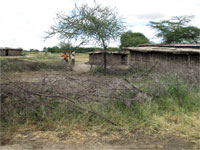|
Kisangaji is fortunate to be in the Rift Valley where the spring waters on the very edge of the village supply their main crop: rice. Avacado, banana, and mango trees also grow in the area. However, due to the remoteness of Kisangaji there is little commerce in the village and villagers must be very self-sufficient. The main mode of transportation is walking or bicycle. The nearest large town is Babti, an hour away by vehicle. The village Magugu is 10 km away and has some infrastructure and commerce.
 Most people in the village live off their land and what the land produces. Many people have chickens, goats, and cows. Depending on one’s financial means, a typical villager has one structure on their property that is the main home. If you have the means, you will have a separate structure for the livestock, the kitchen, and storage. However, many villagers only have one structure on the property that serves as the living quarters, kitchen, and livestock stalls at night. During the day, the men tend to the livestock and home maintenance; the women look after firewood for the kitchen, meals and attending some day-markets. Everyone works in the rice and maize fields. Most people in the village live off their land and what the land produces. Many people have chickens, goats, and cows. Depending on one’s financial means, a typical villager has one structure on their property that is the main home. If you have the means, you will have a separate structure for the livestock, the kitchen, and storage. However, many villagers only have one structure on the property that serves as the living quarters, kitchen, and livestock stalls at night. During the day, the men tend to the livestock and home maintenance; the women look after firewood for the kitchen, meals and attending some day-markets. Everyone works in the rice and maize fields.
The leading causes of death in the region are Malaria and HIV. Malaria is a disease that is spread by the mosquito-bite. While it is both treatable and preventable, most villagers do not have the means to protect themselves sufficiently, or, if infected, obtain the necessary medical attention due to cost. Over the years, the Kisangaji Project built a home for a doctor, secured a doctor for the village, and worked with the District government to have a medical clinic in the village. This has been one of the biggest accomplishments of the Project it all its years. Still, some villagers do not use the medical clinic because of superstition or stigma--they do not want others to know that they have a medical problem. This is part of the culture of the Mbugwe tribe.
Kisangaji is approximately 70% Christian and 30% Muslim.
|

